|
|
|
Sort Order |
|
|
|
Items / Page
|
|
|
|
|
|
|
| Srl | Item |
| 1 |
ID:
083623
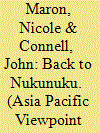

|
|
|
|
|
| Publication |
2008.
|
| Summary/Abstract |
Abstract: Return migration has escaped significant analysis in the Pacific island region. Both migration from and return migration to the Tongan village of Nukunuku are for multiple reasons, with migration centred on employment and education, and return centred on the social context of home and duty. Return is limited, with intentions not being matched with practice, and the village and national population not growing. However, return migrants acquire skills, capital and experience overseas, which can be transferred into a Tongan cultural context, although identities have changed during migration. Return migrants typically take up employment or acquire businesses on return, gain some social status from the outcome, and are neither failures nor retirees. Nonetheless, return engenders expectations and tensions exist between returnees and more established residents, although ultimately, return migrants contribute to household, local and national development, as part of an unfinished process.
|
|
|
|
|
|
|
|
|
|
|
|
|
|
|
|
| 2 |
ID:
084427
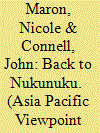

|
|
|
|
|
| Publication |
2008.
|
| Summary/Abstract |
Abstract: Return migration has escaped significant analysis in the Pacific island region. Both migration from and return migration to the Tongan village of Nukunuku are for multiple reasons, with migration centred on employment and education, and return centred on the social context of home and duty. Return is limited, with intentions not being matched with practice, and the village and national population not growing. However, return migrants acquire skills, capital and experience overseas, which can be transferred into a Tongan cultural context, although identities have changed during migration. Return migrants typically take up employment or acquire businesses on return, gain some social status from the outcome, and are neither failures nor retirees. Nonetheless, return engenders expectations and tensions exist between returnees and more established residents, although ultimately, return migrants contribute to household, local and national development, as part of an unfinished process.
|
|
|
|
|
|
|
|
|
|
|
|
|
|
|
|
| 3 |
ID:
178756
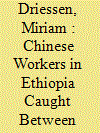

|
|
|
|
|
| Summary/Abstract |
Ever since Beijing has sought to fuel domestic growth through Chinese-led development overseas—first under the aegis of Jiang Zemin’s Going Out Policy and more recently as part of Xi Jinping’s Belt and Road Initiative—thousands of Chinese have moved overseas for work. Africa has been one of the destinations of Chinese companies and their expatriate staff. Although we have learned a great deal about China’s mega-projects across the African continent, little is known about the certified engineers and experienced builders who carry them out. What brings them to Africa? And, more importantly, what makes them stay for years on end, even if they wish to return to China? In this article I zoom in on the lives of Chinese men employed in Ethiopia’s construction industry to show how three decades of domestic growth in China has pushed workers overseas, while jeopardizing their return. Workers’ lives are marked by double displacement. They are not only isolated from local African communities through a dormitory labour regime that controls their time and limits their mobility, but also, more importantly, they are displaced from social life in China. Domestic development has at once increased aspirations and made them harder to obtain, especially for men, who are expected to fulfill the promise of upward social mobility for themselves and their families. In order to realize aspirations and meet social expectations related to social reproduction, geographic mobility has become a necessity for men who cannot rely on family wealth or connections, forcing them into a state of suspension.
|
|
|
|
|
|
|
|
|
|
|
|
|
|
|
|
| 4 |
ID:
185331
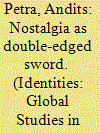

|
|
|
|
|
| Summary/Abstract |
Based on multi-sited ethnography, this article examines the return visits of Australian-Hungarian diaspora subjects after the fall of the Berlin Wall. In particular, it explores how nostalgia becomes an instrument for navigating the ambiguities, paradoxes, and disappointments of return and forging new and creative relationships with the home country. I argue that as much as nostalgia has contributed to the shattering of returnees’ illusions in the face of ‘reality’ upon returning, it has also helped them to facilitate deeper feelings of immersion with their home country. In this way, this article elucidates the restorative properties of nostalgia for identity and belonging.
|
|
|
|
|
|
|
|
|
|
|
|
|
|
|
|
| 5 |
ID:
180729
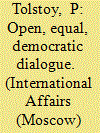

|
|
|
|
|
| Summary/Abstract |
IN THE SUMMER OF 2019, an event took place that we had been waiting for for several years: Russia returned to the Parliamentary Assembly of the Council of Europe, and the rights of the Russian delegation were fully restored.
|
|
|
|
|
|
|
|
|
|
|
|
|
|
|
|
| 6 |
ID:
092750


|
|
|
|
|
| Publication |
2009.
|
| Summary/Abstract |
This article presents a model for investing in renewable energies in the framework of the Spanish electricity market in a way that risk is minimised for the investor while returns are maximised. The model outlined here is based on an economic model for calculating cash flows intended to obtain the internal rate of return (IRR) of the different energies being studied: wind, photovoltaic, mini hydro and thermo electrical. The IRRs obtained are considered the returns on investments, while their standard deviations are considered associated risks. In order to minimise risk, a comprehensive portfolio of investments is created that includes all of the available energies by means of a system of linear equations. The solution of the linear system is graphically checked using the efficient frontier method for the different financing options. Several case studies within the Renewable Energies Plan (PER is its Spanish abbreviation) that is in force in Spain in the period 2005-2010 are analysed in order to illustrate the method, as are other case studies using different types of financing, helping us to reach the pertinent conclusions.
|
|
|
|
|
|
|
|
|
|
|
|
|
|
|
|
| 7 |
ID:
171103
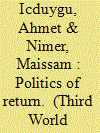

|
|
|
|
|
| Summary/Abstract |
Although the Syrian conflict continues, local and global stakeholders have already begun to consider the return of the six million refugees, especially as neither the option of local integration in the countries of first asylum nor that of resettlement to third countries is seen as a realistic possibility. Elaborating on the return debates in Turkey, Lebanon and Jordan, we relate the politicisation of this question to the growing acceptance of the option of voluntary and involuntary repatriation in the international refugee regime as well as to policies and public opinion. We argue, based on empirical fieldwork, that any debate about the return of Syrian refugees is problematic, since the conditions of safety, voluntariness and sustainability are not fulfilled. Further, returns should not be left entirely to the individual hosting states and actors in the region but should be carried out in collaboration with representative authorities in Syria and the mediation of international organisations upon full resolution of conflict.
|
|
|
|
|
|
|
|
|
|
|
|
|
|
|
|
| 8 |
ID:
086059
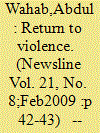

|
|
|
|
|
| Publication |
2009.
|
| Summary/Abstract |
Armed resistance groups withdraw their announcement of a unilateral ceasefire
|
|
|
|
|
|
|
|
|
|
|
|
|
|
|
|
|
|
|
|
|